Since you have landed to this super informative, usable and actionable page, we believe that you already have a rock-solid discovery report with you.
A discovery report for startups is a document that outlines the results of a research and discovery phase of a project. This phase is usually performed at the beginning of a project to understand the business problem or opportunity, identify user needs and behaviours, and gather relevant information and data.The discovery report typically includes the following elements:
- Problem statement: A clear and concise description of the business problem or opportunity that the project aims to address.
- User research : customer personas: An analysis of user needs, behaviours, and pain points, based on qualitative and quantitative research methods such as interviews, surveys, and user testing.
- Competitor analysis: A review of the competitive landscape, including an analysis of strengths, weaknesses, and opportunities of the competition.
- Market analysis and planning: An overview of the target market and customer segments, including information about size, growth rate, and trends.
- Technical feasibility: An assessment of the technical feasibility of the project, including a review of existing technologies, infrastructure, and resources.
- Recommendations: A set of recommendations for moving forward with the project, based on the findings and analysis presented in the report.
- SWOT & PESTEL analysis: SWOT analysis is a strategic planning tool used to evaluate the Strengths, Weaknesses, Opportunities, and Threats involved in a business venture or project.PESTEL analysis on the other side, is a framework used to analyse the Political, Economic, Sociocultural, Technological, Environmental, and Legal factors affecting a business. This analysis can be used by startups to understand the external macro-environment they operate in and identify potential challenges and opportunities.
- IP Strategy and Commercialization Plan: Intellectual Property (IP) commercialization is the process of taking a startup's IP assets and turning them into profitable products or services. It is an important aspect of a startup's growth and success, as IP assets such as patents, trademarks, and copyrights can provide the foundation for new products and services, generate revenue, and build brand recognition.
The discovery report serves as a foundation for the rest of the project, and it helps stakeholders understand the scope and direction of the project, and make informed decisions.
Other formal requirements include:
- Business Plan: A comprehensive outline of the company's vision, mission, and strategy.
- Financial Projections: A realistic estimate of the startup's financial future, including revenue, expenses, and cash flow.
- Legal Documents: Essential legal documents such as incorporation papers, employment contracts, and non-disclosure agreements.
- Pitch Deck: A visual presentation to showcase the company's idea and business model to potential investors.
- Technology Stack: A list of the technologies and tools needed to develop and scale the startup's products or services.
- Operations Plan: A plan for running the day-to-day operations of the startup, including processes for hiring, management, and workflow.
- Networking List: A list of relevant industry events, conferences, and online communities for networking and finding potential partners and investors.
The above are the must haves before a startup could get onboarded with the technology stacks. In case you have missed out anything, and need expert help, we are just a click away. Ask Idea2MVP domain experts, Now! Else, please proceed with our list of selected and curated technology stack…
Seven pillars of efficient startup operation:
Accounting & Invoicing
Collaboration & Communicaton
WebApp Developmemnt Frameworks
Data Analytics
Cloud Storage
Payment Processing
Project Management: These tools help startups manage tasks, deadlines, and team communication. Here are the top 3 selected Project Management tools by Idea2MVP experts
Microsoft Project Online is by far, the best tool for managing projects of any size. Microsoft Project Online is a cloud-based project management solution that provides project management, collaboration, and resource planning tools to organizations of all sizes. It allows teams to work on projects from virtually anywhere, using a web browser or the Project Online desktop app, and offers features such as task assignment, Gantt charts, resource management, and real-time reporting. Project Online integrates with other Microsoft Office tools and can be customized to meet the specific needs of an organization. Some of the top benefits of Microsoft project Online are:
- Collaboration: Microsoft Project Online enables teams to work together in real-time, share project information, and communicate more effectively.
- Project Portfolio Management: Project Online provides a centralized platform for managing multiple projects and resources, allowing organizations to prioritize and allocate resources effectively.
- Resource Management: The tool allows organizations to manage and allocate resources effectively, track utilization and availability, and optimize resource allocation across projects.
- Task Management: Project Online provides an intuitive and user-friendly interface for tracking and managing tasks, deadlines, and dependencies.
- Real-time Insights: The tool provides real-time project data and analytics, enabling organizations to make informed decisions and adjust their project plans as needed.
- Scalability: Microsoft Project Online can be customized to meet the specific needs of an organization, and can be scaled to accommodate growth and changing business requirements.
- Integration: Project Online integrates with other Microsoft tools, such as SharePoint, Teams, and Power BI, which can help startups streamline their workflows and improve collaboration.
- Mobile Access: Project Online can be accessed from anywhere and on any device, making it easy for team members to stay connected and informed, even when they're on the go.
Overall, Microsoft Project Online can help startups increase efficiency, improve collaboration, and make data-driven decisions, which can support their growth and success.
Did You Know?
Here are some interesting facts about Microsoft Project Online:
- Microsoft Project Online was first released in 2013 as a cloud-based version of Microsoft Project Server.
- It is part of the Microsoft Office 365 suite of productivity tools and can be easily integrated with other Office 365 apps like Microsoft Teams, SharePoint, and OneDrive.
- Project Online allows organizations to manage projects from anywhere, on any device, and with real-time collaboration capabilities.
- The tool provides a flexible project management methodology that can be customized to meet the specific needs of an organization, including Agile, Waterfall, and Hybrid project methodologies.
- Project Online provides a comprehensive set of tools for managing project portfolios, including resource allocation, project prioritization, and project financial management.
- It allows for real-time collaboration between project managers, team members, stakeholders, and customers, enabling organizations to make informed decisions and adjust their project plans as needed.
- Project Online provides real-time dashboards and analytics, giving organizations an in-depth view of project performance and the ability to make informed decisions.
- Microsoft Project Online is used by organizations of all sizes, including small businesses, large enterprises, and government agencies.
- The tool is highly customizable and can be easily tailored to meet the unique needs of any organization.
- Microsoft Project Online has received several awards and recognition, including being named a Leader in the Gartner Magic Quadrant for Project Portfolio Management.
Monday.com is a cloud-based project management and team collaboration tool designed to help organizations and teams manage their work, processes, and projects efficiently. It provides features such as task management, team collaboration, project tracking, resource planning, and custom workflow automation. Monday.com is known for its flexible and visual interface, allowing users to easily create boards, track progress, and visualize data. It also offers integration with other tools and services and is suitable for a wide range of industries and team sizes. Some of its benefits include:
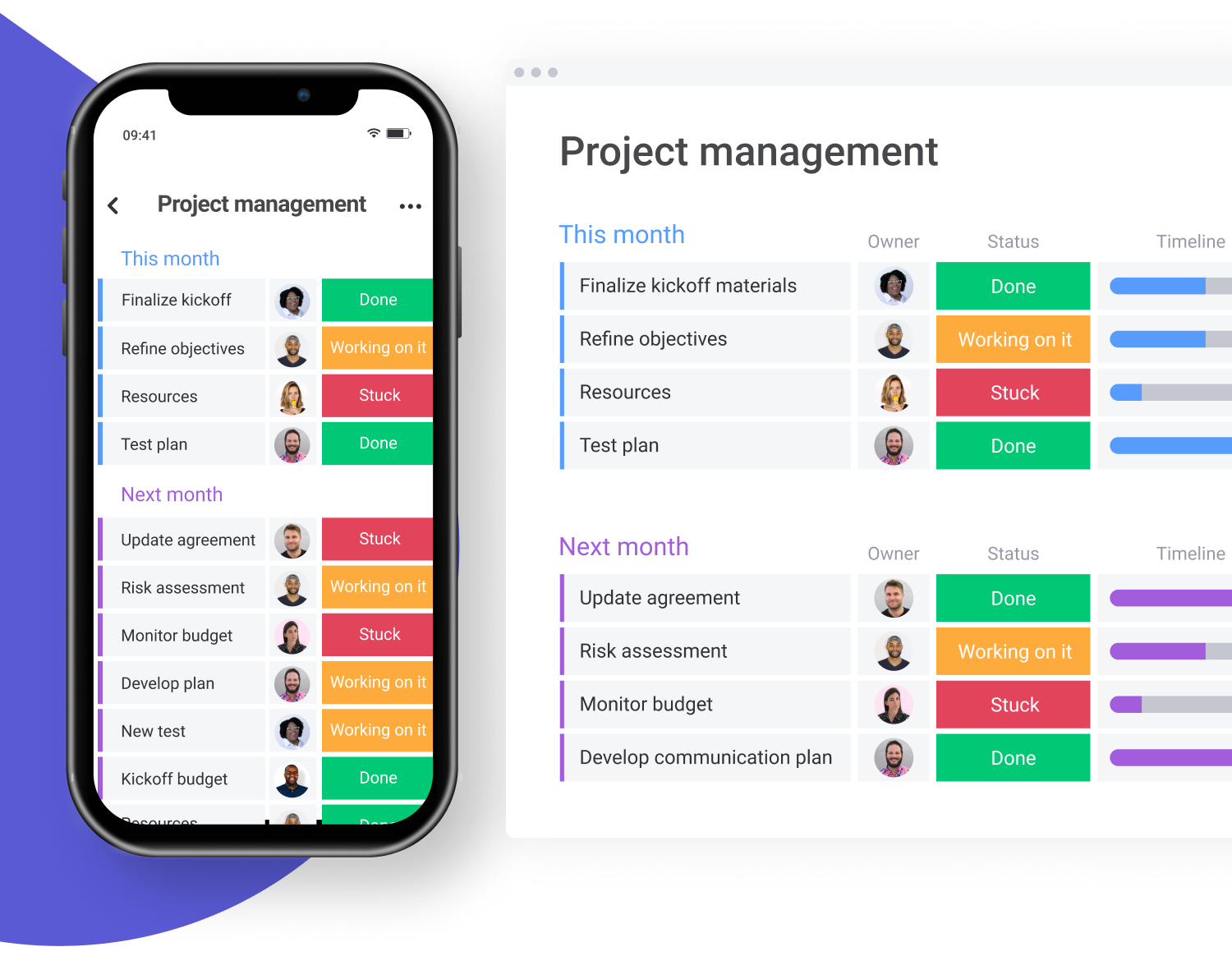
- Customizable workflows and boards: Monday.com allows you to create custom workflows and boards that match your team's unique processes.
- Real-time collaboration: Monday.com allows teams to work together in real-time, with features such as team chat and comments.
- Task management: Monday.com provides a clear overview of tasks, deadlines, and responsibilities, making it easy to keep track of what needs to be done.
- Reporting and Analytics: Monday.com provides detailed reports and analytics, making it easy to track progress and identify areas for improvement.
- Integration with other tools: Monday.com integrates with a variety of other tools, such as Google Drive, Slack, and Zapier, making it easy to work with other tools your team is already using.
- Mobile App: Monday.com has a mobile app, which allows users to access the platform on the go and stay updated on their projects.
- User-friendly interface: Monday.com has a user-friendly interface, making it easy for teams to start using the platform with minimal training.
Did You Know?
Here are some interesting facts about monday.com:
- monday.com is a web-based project management and collaboration tool that was founded in 2014.
- monday.com is designed to help teams manage projects, tasks, and workflow, and is used by businesses of all sizes, including small startups and large enterprises.
- monday.com provides a visual platform that allows users to create boards, timelines, and calendars to represent projects and tasks, and includes features such as automatic progress updates, real-time collaboration, and integrations with other tools.
- monday.com has over 80,000 customers in more than 190 countries and is used in a variety of industries, including technology, marketing, and finance.
- monday.com is known for its user-friendly interface and customization options, which allow teams to tailor the platform to their specific needs and workflows.
- monday.com is headquartered in Tel Aviv, Israel and has additional offices in New York and London.
Trello is a web-based project management and collaboration tool. It allows users to organize and prioritize projects and tasks by creating boards, lists, and cards. The boards, lists, and cards can be used to represent tasks, ideas, or anything else that needs to be organized. Trello also provides features such as due dates, labels, comments, and attachments to help users stay on top of their projects and collaborate with team members effectively. Some of its benefits include:

- Easy to use: Trello has a simple and intuitive user interface, making it easy for teams to start using the platform with minimal training.
- Visual organization: Trello uses a visual, card-based system to organize tasks and projects, making it easy to see what needs to be done and who is responsible for it.
- Collaboration: Trello allows teams to collaborate in real-time, with features such as comments, attachments, and mentions.
- Flexibility: Trello is flexible and can be used for a wide range of projects, from personal to-do lists to complex project management.
- Mobile access: Trello has a mobile app, which allows users to access their projects and collaborate with their team on the go.
- Integrations: Trello integrates with a variety of other tools, such as Google Drive, Slack, and Zapier, making it easy to work with other tools your team is already using.
- Customization: Trello allows for customization, including the ability to add custom backgrounds, stickers, and more, making it a fun and visually appealing tool to use.
Did You Know?
Here are some interesting facts about Trello:
- Trello was created by Fog Creek Software in 2011, and later became a standalone company in 2014.
- Trello's user interface is based on the concept of a "kanban board," which is a visual way of organizing tasks and projects that originated in Japanese manufacturing.
- Trello has over 50 million registered users and is used by individuals, small businesses, and Fortune 500 companies for project management, software development, and more.
- Trello is available as a web application, as well as on iOS and Android mobile devices, and has integrations with a variety of other tools and services, such as Google Drive, Slack, and Microsoft Teams.
- Trello has a playful and colorful design, which has helped it stand out among other project management tools and has been a factor in its popularity and success.
Accounting and Invoicing: The role of accounting and invoicing technology stack for startups is to streamline their financial operations and manage their finances effectively. The technology stack helps automate key accounting tasks such as bookkeeping, billing, invoicing, and payment processing. It also helps generate real-time financial reports, analyse business performance, and make informed financial decisions. The use of this technology stack helps startups to save time, reduce manual errors, and increase efficiency in their financial operations, allowing them to focus on their core business activities.Applications like Zoho Books, Xero, or FreshBooks can help startups manage their finances and invoicing. Learn more about these top 3 Accounting and Invoicing tools as suggested by Idea2MVP punters.
Zoho Books is an online accounting software designed for small businesses, freelancers, and non-profit organizations. Zoho Books provides a range of benefits for startups, including:
- Affordability: Zoho Books offers flexible pricing plans that are affordable for startups, with prices starting at a low monthly fee.
- User-Friendly Interface: Zoho Books has a simple and intuitive interface that makes it easy for startups to manage their finances, even if they have limited accounting experience.
- Automated Workflow: Zoho Books automates many of the manual tasks associated with accounting, such as invoicing, expenses, and bank reconciliation, freeing up time for startups to focus on growing their business.
- Real-Time Financial Data: Zoho Books provides real-time financial data and insights, enabling startups to make informed decisions and monitor their financial performance in real-time.
- Integration: Zoho Books integrates with a range of other Zoho applications, such as Zoho CRM and Zoho Invoice, providing a seamless experience for startups.
- Secure: Zoho Books uses bank-level encryption and two-factor authentication to ensure the security of financial data, providing peace of mind for startups.
- Mobile Access: Zoho Books' mobile app provides startups with access to their financial data and tools from anywhere, enabling them to manage their finances on-the-go.
Overall, Zoho Books provides a comprehensive and cost-effective solution for startups to manage their finances, making it a popular choice for many new businesses.
Did You Know?
Here are some interesting facts about Zoho Books:
- Zoho Books was first released in 2007 as part of the Zoho suite of online productivity and business tools.
- It is a cloud-based accounting software that provides a complete solution for small businesses, freelancers, and non-profit organizations.
- Zoho Books integrates with other Zoho applications, such as Zoho CRM, Zoho Invoice, and Zoho Projects, providing a seamless experience for users.
- The software is designed to be user-friendly and easy to use, with a simple, intuitive interface and a range of helpful features.
- Zoho Books provides real-time financial data and analytics, enabling users to make informed decisions and manage their finances more effectively.
- The software supports multiple currencies and offers multi-language support, making it a popular choice for businesses operating globally.
- Zoho Books provides robust security features, including SSL encryption, two-factor authentication, and data backup and recovery.
- The software is regularly updated with new features and improvements, ensuring that users always have access to the latest tools and capabilities.
- Zoho Books is a cost-effective solution for small businesses, offering flexible pricing plans that are affordable and customizable to meet the specific needs of each business.
- Zoho Books has received positive reviews and recognition from customers and industry experts, with many praising its ease of use, affordability, and comprehensive set of features.
Xero is a popular choice for startups due to its range of features and ease of use. Some of the benefits of using Xero for startups include:

- Ease of Use: Xero's simple and intuitive interface makes it easy for startup owners and their teams to manage their finances without having to worry about complex accounting processes.
- Automated Workflow: Xero automates many of the manual tasks associated with accounting, such as invoicing, bank reconciliation, and financial reporting.
- Real-Time Financial Data: Xero provides real-time financial data and insights, enabling startups to make informed decisions and monitor their financial performance in real-time.
- Integration: Xero integrates with a range of other business tools and services, such as payroll, point-of-sale systems, and payment gateways, providing a seamless experience for startups.
- Affordable: Xero offers flexible pricing plans that are affordable for startups and can be customized to meet their specific needs.
- Secure: Xero uses bank-level encryption and two-factor authentication to ensure the security of financial data, providing peace of mind for startups.
- Mobile Access: Xero's mobile app provides startups with access to their financial data and tools from anywhere, enabling them to manage their finances on-the-go.
Overall, Xero provides a comprehensive and cost-effective solution for startups to manage their finances, making it a popular choice for many new businesses.
Did You Know?
Here are some interesting facts about Xero:
- Founding: Xero was founded in 2006 in New Zealand by Rod Drury and Hamish Edwards.
- Growth: Xero has grown rapidly, with over 2 million subscribers worldwide, making it one of the largest cloud accounting solutions globally.
- Global Expansion: Xero has expanded globally, with offices in the UK, US, Australia, and New Zealand, serving customers in over 180 countries.
- Awards: Xero has received numerous awards, including being named as a leader in the Gartner Magic Quadrant for Cloud Financial Corporate Performance Management Solutions.
- Integration: Xero integrates with over 700 business apps and services, making it easy for businesses to connect with the tools and services they use.
- Social Responsibility: Xero is committed to making a positive impact on the world, and supports numerous social responsibility initiatives, including carbon offsetting and sustainable business practices.
- Security: Xero uses bank-level encryption and two-factor authentication to ensure the security of financial data, making it a secure solution for businesses.
Overall, Xero has established itself as a leading cloud accounting solution, with a range of features, integrations, and a commitment to social responsibility, making it a popular choice for businesses of all sizes.
FreshBooks is a cloud-based accounting solution that provides a range of features for startups, including invoicing, expense tracking, and time tracking. Here are some of the benefits of using FreshBooks for startups:
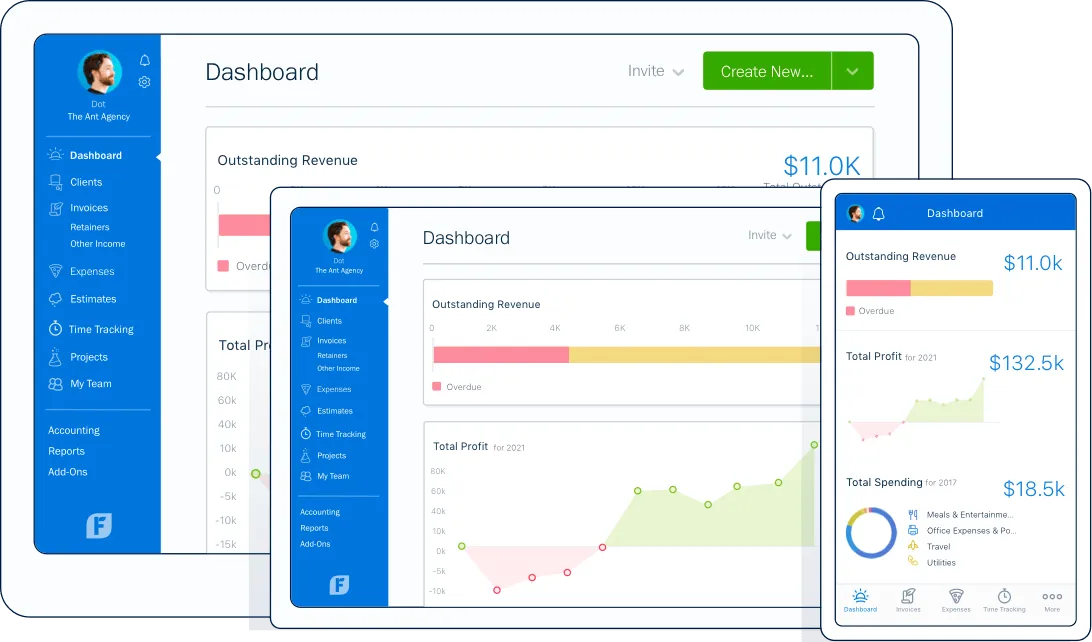
- User-Friendly Interface: FreshBooks has a simple and intuitive interface that makes it easy for startups to manage their finances, even if they have limited experience.
- Affordable Pricing: FreshBooks offers flexible pricing plans that are affordable for startups, with prices starting at a low monthly fee.
- Automated Invoicing: FreshBooks automates many of the manual tasks associated with invoicing, such as creating and sending invoices, reminding clients about overdue payments, and tracking payment status.
- Time Tracking: FreshBooks provides time tracking features, enabling startups to track the time they spend on projects and bill their clients accurately.
- Integrations: FreshBooks integrates with a range of other business tools and services, such as payment gateways, project management tools, and marketing automation tools, providing a seamless experience for startups.
- Mobile Access: FreshBooks' mobile app provides startups with access to their accounting tools from anywhere, enabling them to manage their finances on-the-go.
- Overall, FreshBooks provides a comprehensive and cost-effective solution for startups to manage their finances, making it a popular choice for many new businesses.
Did You Know?
Here are some interesting facts about FreshBooks:
- Founded in 2003: FreshBooks was founded in 2003 by Mike McDerment in Toronto, Canada.
- Focus on Small Businesses: FreshBooks was designed specifically to meet the needs of small businesses and freelancers, and it continues to be a popular choice for these types of businesses.
- Cloud-Based: FreshBooks is a cloud-based accounting solution, which provides users with access to their financial data from anywhere with an internet connection.
- Mobile App: FreshBooks has a mobile app that provides users with access to their accounting tools from their mobile devices, enabling them to manage their finances on-the-go.
- Integrations: FreshBooks integrates with a range of other business tools and services, such as payment gateways, project management tools, and marketing automation tools, providing a seamless experience for users.
- Growth: FreshBooks has grown rapidly since its founding, with thousands of businesses and freelancers using the platform to manage their finances.
- Awards: FreshBooks has been recognized for its innovative solutions and commitment to customer service, and has received several awards, including the Tech Culture Award from the Canadian HR Association.
Overall, FreshBooks is a well-established and highly respected provider of accounting solutions for small businesses and freelancers, and its continued growth and success are a testament to the quality of its products and services.
Collaboration and Communication: Tools like Microsoft Teams, Slack, or Google Workspace can help startups communicate and collaborate with team members and clients.Here are the details of top 3 selected Collaboration and communication tools highly recommended by Idea2MVP experts.
Microsoft Teams is a collaboration and communication platform that is particularly beneficial for startups, as it offers a range of features to help teams stay connected, organized and productive. Here are some of the key benefits of Microsoft Teams for startups:
- Real-time communication: Teams allows for instant messaging, voice and video calls, and screen sharing, making it easy for team members to stay in touch and collaborate in real-time.
- Increased productivity: Teams integrates with a range of Microsoft Office apps, including Word, Excel, and PowerPoint, making it possible for teams to work on projects together in real-time, regardless of their location.
- Better organization: Teams allows users to create channels for specific projects or teams, making it easier for teams to stay organized and keep track of discussions and tasks.
- File storage and sharing: Teams provides a centralized place to store and share files, which helps to reduce the risk of losing important documents and ensures that everyone has access to the latest versions.
- Integration with other tools: Teams integrates with a range of third-party apps and services, such as Trello and Asana, making it possible for teams to bring all their tools into one platform.
- Cost-effective: Microsoft Teams is a cost-effective solution for startups, especially when compared to other enterprise collaboration platforms. Plus, it is available as part of the Microsoft 365 suite, which also includes Office apps, email, and other tools.
In conclusion, Microsoft Teams provides startups with a comprehensive collaboration and communication platform that can help to increase productivity, improve organization, and reduce costs.
Did You Know?
Here are some interesting facts about Microsoft Teams:
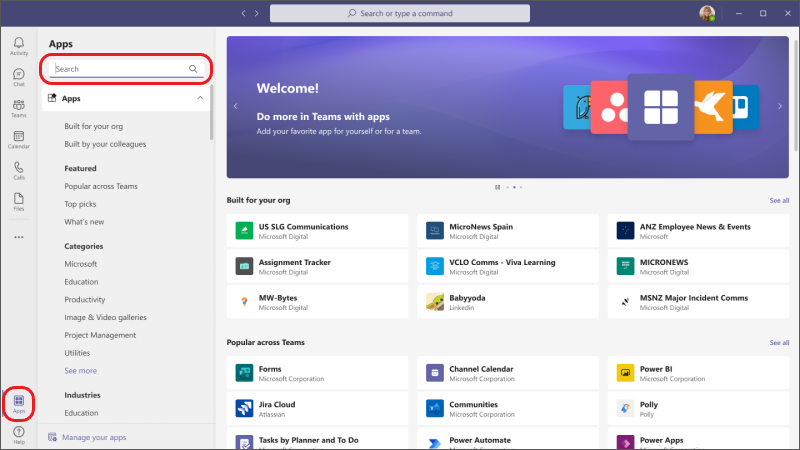
- Microsoft Teams was launched in 2016 and has since become one of the most popular collaboration platforms for remote teams.
- Teams integrates with other Microsoft services such as SharePoint, OneDrive, and Outlook, making it a one-stop-shop for communication and collaboration.
- Teams supports real-time audio and video calling, screen sharing, and file sharing, allowing for seamless collaboration even when working remotely.
- Teams has a customizable interface, allowing users to tailor the app to their specific needs and preferences.
- Teams allows for the creation of channels, which are dedicated areas for specific projects, teams, or topics. This helps keep conversations organized and easy to follow.
- Teams offers a range of third-party apps and integrations, including Trello, Asana, Hootsuite, and more, making it even more powerful and versatile.
- Teams also has robust security and compliance features, including data encryption and eDiscovery capabilities, making it a popular choice for enterprise-level organizations.
- Teams has over 115 million daily active users, making it one of the most widely used collaboration platforms in the world.
- Teams is available on desktop and mobile, making it accessible and convenient for users to stay connected and collaborate from anywhere.
- Microsoft is continuously updating and improving Teams, adding new features and capabilities to keep pace with the evolving needs of its users.
Slack is a popular collaboration and communication platform, especially for startups. Some of the benefits of Slack for startups include:

- Increased Productivity: Slack's real-time messaging and collaboration features allow teams to communicate and share information more efficiently, resulting in increased productivity.
- Improved Communication: Slack allows teams to stay connected, no matter where they are located. This helps to reduce miscommunication and improves overall communication between team members.
- Better Organization: Slack allows teams to organize conversations into channels, making it easy to find and review important information.
- Enhanced Collaboration: Slack's integration with other tools such as Google Drive, Dropbox, and Trello, makes it easier for teams to collaborate and share files.
- Improved Decision Making: Slack's search functionality makes it easy to find relevant information, allowing teams to make informed decisions more quickly.
- Increased Mobility: Slack is available on desktop and mobile devices, making it easy for teams to stay connected and collaborate from anywhere.
- Reduced Email Overload: Slack helps to reduce the amount of internal email communication, freeing up team members' inboxes and reducing email overload.
- Better Employee Engagement: Slack's playful interface and fun features like emojis and gifs can help to improve employee engagement and foster a positive work environment.
- Cost-Effective: Slack offers a range of pricing options, making it a cost-effective solution for startups.
- Easy to Use: Slack is user-friendly and easy to set up, making it a great option for startups that are looking for a simple and effective collaboration platform.
Did You Know?
Here are some interesting facts about Slack:
- Slack was founded in 2014 by Stewart Butterfield, Eric Costello, Cal Henderson, and Serguei Mourachov.
- The company was initially created as an internal communication tool for a failed gaming company, but the founders saw the potential for it to be a standalone product and turned it into a business.
- Slack is short for "Searchable Log of All Conversation and Knowledge".
- Slack has over 12 million daily active users and is used by organizations in various industries, including technology, finance, healthcare, and education.
- Slack offers a range of features including real-time messaging, file sharing, and integration with other tools like Google Drive and Trello.
- In 2019, Slack went public through a direct listing, becoming the largest software company to do so at the time.
- Slack has a strong and passionate user base, with many users praising the tool for its ability to improve team communication and collaboration.
- The company has faced intense competition from Microsoft Teams, which has been growing rapidly and posing a challenge to Slack's market position.
- Despite the competition, Slack has continued to innovate and expand its product offerings, including the launch of Slack Calls and Slack Voice, which allow users to make voice and video calls within the platform.
Website Development: Latest technology frameworks like .NET Core MVC, PHP Laravel or MERN (MongoDB, Express, React, Node) can help startups build and manage their websites or portals. Here are the details of top 3 technology development frameworks used by Idea2MVP solution architects.
.NET Core is a modern and powerful framework for building web applications and services. The MVC (Model-View-Controller) architectural pattern is a popular choice for building web applications with .NET Core, as it provides a number of benefits, including:
- Cross-Platform Compatibility: .NET Core is designed to be a cross-platform framework, meaning that you can build and run applications on Windows, macOS, and Linux. This makes it a great choice for developing applications that need to run on multiple operating systems.
- High Performance: .NET Core is optimized for performance, and can handle large amounts of traffic and data with ease. This makes it ideal for building high-performance, scalable applications.
- Modular Design: .NET Core is built on a modular architecture, which means that you can choose only the components you need, and reduce the size and complexity of your application.
- Robust and Secure: .NET Core has been designed with security and reliability in mind, and includes features such as authentication and authorization, data protection, and configuration management, which can help you build secure and reliable applications.
- Efficient Development: The MVC pattern provides a clear separation of concerns between the presentation, data, and logic layers of your application. This makes it easier to develop, test, and maintain your code, and helps you to build high-quality, maintainable applications.
- Large Community: .NET Core has a large and active community of developers and users, and there are many resources available online, including tutorials, forums, and documentation, that can help you get started and learn more about the framework.

Overall, .NET Core MVC provides a flexible, efficient, and secure platform for building web applications and services, and is a great choice for developers looking to build modern, scalable applications.
Did You Know?Here are some interesting facts about the ..NET Core MVC framework
- Open Source: .NET Core is an open source framework, and its source code is available on GitHub. This makes it easy for developers to contribute to the development of the framework, and to create custom extensions and tools.
- High Compatibility with ASP.NET: .NET Core MVC is fully compatible with ASP.NET, and you can reuse your existing ASP.NET code and libraries with .NET Core.
- Fast Development: .NET Core MVC provides a number of features and tools that make it easy to develop web applications quickly and efficiently, including Razor Pages, a simplified development model for building web pages, and the ability to create reusable UI components using partial views.
- Cloud Ready: .NET Core MVC is designed to be cloud-ready, and can be deployed to popular cloud platforms, such as Azure and Amazon Web Services (AWS), with ease.
- Modern Web Standards: .NET Core MVC supports modern web standards, such as HTML5, CSS3, and JavaScript, and provides tools for building single-page applications (SPAs) using popular JavaScript frameworks, such as Angular and React.
- Continuous Integration and Deployment (CI/CD): .NET Core MVC integrates well with popular CI/CD tools, such as Azure DevOps, and provides features that make it easy to automate the deployment of your applications.
- Growing Ecosystem: The .NET Core ecosystem is growing rapidly, with a large number of third-party libraries and tools available for a wide range of use cases, from data access and storage, to security and authentication, to front-end development and more.
- These are just a few of the interesting facts about the .NET Core MVC framework, and why it is a great choice for building modern, scalable, and secure web applications.
PHP Laravel :is a popular web application framework that provides a number of benefits for startups:

- Easy to Learn: Laravel is known for its elegant and straightforward syntax, which makes it easy for developers to pick up and start using, even if they are new to PHP or web development.
- Rapid Development: Laravel provides a number of features and tools that can help you build web applications quickly and efficiently, such as Artisan, Laravel's command-line interface, and Eloquent, Laravel's ORM (Object-Relational Mapping) for database access.
- Scalability: Laravel is built with scalability in mind, and provides features that can help you build scalable applications, such as job queues and caching.
- Built-in Security: Laravel includes a number of security features, such as password hashing and encryption, to help you keep your applications secure.
- Large Community: Laravel has a large and active community of developers and users, and there are many resources available online, including tutorials, forums, and documentation, that can help you get started and learn more about the framework.
- Cost-Effective: Since Laravel is open source software, there is no licensing cost associated with using it, which can be a big advantage for startups with limited budgets.
- Integrations: Laravel provides a number of integrations with other tools and technologies, such as Amazon Web Services (AWS), Stripe, and Slack, which can help you build powerful and integrated applications.
Overall, Laravel provides a flexible, efficient, and secure platform for building web applications, and is a great choice for startups looking to build high-quality, scalable applications quickly and efficiently.
PHP Laravel :is a popular web application framework that provides a number of benefits for startups:
- Modern PHP Framework: Laravel is a modern PHP framework that is designed to provide an enjoyable and productive development experience for developers.
- Easy Routing: Laravel provides an easy-to-use routing system that makes it simple to define the URL patterns for your application, and to map those patterns to specific actions.
- Blade Templating Engine: Laravel includes its own templating engine, called Blade, which provides a simple and intuitive syntax for building dynamic views.
- Artisan Command Line Interface: Laravel includes a command-line interface, called Artisan, which provides a number of helpful commands for common development tasks, such as generating boilerplate code and running database migrations.
- Built-in Task Scheduling: Laravel includes built-in task scheduling, which makes it easy to schedule tasks, such as sending emails, running database backups, and more.
- Eloquent ORM: Laravel includes an ORM (Object-Relational Mapping) called Eloquent, which provides an easy-to-use and intuitive way to interact with databases.
- Built-in Testing: Laravel includes built-in testing capabilities, which makes it easy to write and run automated tests for your application, and to ensure that your code is working as expected.
- Growing Community: Laravel has a growing community of developers and users, and there are many resources available online, including tutorials, forums, and documentation, that can help you get started and learn more about the framework.
These are just a few of the interesting facts about the PHP Laravel framework, and why it is a popular choice for building modern, dynamic, and scalable web applications.
MERN is a popular full-stack development framework that combines MongoDB, Express, React, and Node.js, and provides a number of benefits for startups:
- JavaScript Stack: MERN uses a full JavaScript stack, which makes it easy for developers who are already familiar with JavaScript to pick up and start using.
- Rapid Development: The MERN stack provides a number of features and tools that can help you build web applications quickly and efficiently, such as React's virtual DOM, which can speed up the rendering of dynamic content.
- Scalability: Node.js and MongoDB are both highly scalable technologies, which makes MERN a great choice for startups looking to build scalable applications.
- Large Community: The technologies used in the MERN stack have large and active communities of developers and users, and there are many resources available online, including tutorials, forums, and documentation, that can help you get started and learn more about the framework.
- Cost-Effective: Since the technologies used in the MERN stack are open source software, there is no licensing cost associated with using them, which can be a big advantage for startups with limited budgets.
- Single-Page Applications: React makes it easy to build single-page applications, which can provide a better user experience and improve the performance of your web application.
- Easy Database Integration: MongoDB provides an easy-to-use and flexible way to store and retrieve data, and can be easily integrated into your MERN application.
Overall, the MERN stack provides a powerful and flexible platform for building web applications, and is a great choice for startups looking to build high-quality, scalable applications quickly and efficiently.
Did You Know?
Here are some interesting facts about the MERN framework:
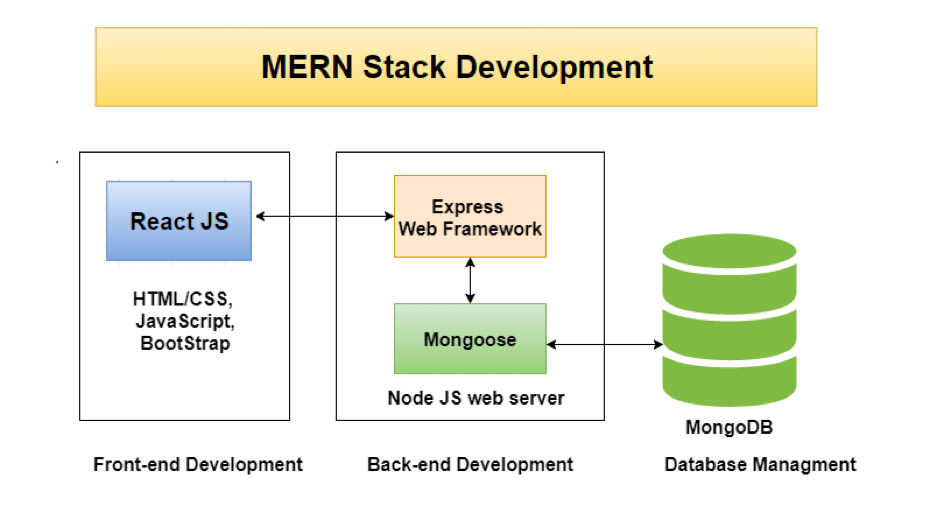
- Full-Stack JavaScript: MERN is a full-stack JavaScript framework, which means that you can use a single programming language, JavaScript, for both the front-end and back-end of your application.
- React-Based Front-End: MERN uses React, a popular JavaScript library for building user interfaces, for the front-end of your application.
- Node.js Back-End: MERN uses Node.js for the back-end of your application, which provides a fast and scalable platform for building server-side applications.
- MongoDB Database: MERN uses MongoDB, a document-oriented database, to store and retrieve data, which provides a flexible and scalable way to store data.
- Open Source: The technologies used in the MERN stack are all open source, which means that they are free to use and can be easily customized and extended to meet your needs.
- Large Community: The technologies used in the MERN stack have large and active communities of developers and users, which means that there is a wealth of resources available online, including tutorials, forums, and documentation, to help you get started and learn more about the framework.
- Growing Adoption: MERN is becoming increasingly popular, and is being used by a growing number of companies and organizations to build web applications.
These are just a few of the interesting facts about the MERN framework, and why it is a popular choice for building full-stack web applications.
Data Analytics is crucial for startups because it helps them make informed decisions and optimize their operations. Here are a few key reasons why startups benefit from data analytics:
- Customer Insights: Startups can use data analytics to gather insights into their customers, including demographics, preferences, and buying habits. This information can be used to tailor their offerings, improve the customer experience, and increase sales.
- Market Analysis: Startups can also use data analytics to analyse their market, including competitors and market trends. This information can help them make informed decisions about product development, pricing, and marketing strategies.
- Performance Tracking: Data analytics can be used to track a startup's performance and measure the success of its initiatives. This information can help the startup identify areas for improvement and make adjustments to its operations accordingly.
- Cost Reduction: By using data analytics to optimize operations, startups can reduce their costs and increase their efficiency. This can help them stay competitive and achieve long-term success.
Overall, data analytics is a powerful tool for startups to make informed decisions, improve their operations, and drive growth.
Data Analytics tools like Power BI, Tableau or Zoho Analytics can help startups track and analyse website and customer behaviour. Here are the details of top 3 used by data experts at Idea2MVP

Microsoft Power BI is a data analytics tool that provides a number of benefits to startups, including:
- Easy Data Visualization: Power BI provides an intuitive interface that makes it easy for startups to visualize and interact with data, without the need for specialized skills.
- Integration with Other Microsoft Tools: Power BI integrates seamlessly with other Microsoft tools, such as Excel and Azure, making it easy for startups to work with data from multiple sources.
- Real-Time Insights: Power BI allows startups to access real-time insights into their operations, which can help them make informed decisions and respond quickly to changing circumstances.
- Scalability: Power BI can scale as startups grow, making it possible for startups to use the same solution even as their needs change over time.
- Collaboration: Power BI allows multiple users to access and collaborate on data and reports, making it easier for startups to work as a team and make informed decisions.
- Customizable Dashboards: Power BI allows startups to create custom dashboards that display only the information that is relevant to their specific needs.
- Cost-Effective: Power BI is a cost-effective solution, making it an ideal choice for startups that are working with limited budgets.
Overall, Microsoft Power BI provides startups with a powerful and flexible tool for data analytics that can help them make informed decisions, optimize their operations, and drive growth. Here are list of business use cases you could use.Click here to view.
WaysAhead Global is a Silver Data Analytics partner of Microsoft. Learn More.
Did You Know?
Here are some interesting facts about Microsoft Power BI:
- Part of Microsoft Stack: Power BI is part of the Microsoft stack, and integrates seamlessly with other Microsoft tools and platforms, such as Excel, SharePoint, and Teams.
- Cloud-Based: Power BI is cloud-based, which means that you can access your data and reports from anywhere, and collaborate with others in real-time.
- Real-Time Insights: Power BI provides real-time insights into your data, and updates visualizations and reports automatically, so you always have the most up-to-date information.
- Customizable: Power BI offers a wide range of customization options, including the ability to create custom visualizations and reports, and to embed Power BI reports and dashboards into other tools and platforms.
- Affordable: Power BI offers flexible pricing options, including a free version, and a range of paid options, making it an affordable solution for businesses of all sizes.
These are just a few of the interesting facts about Power BI, and why it is a powerful and flexible tool for visualizing, analyzing, and sharing your data.
Tableau is a powerful data visualization and business intelligence tool that provides a number of benefits for startups:
- Easy to Use: Tableau has a user-friendly interface and drag-and-drop functionality, which makes it easy to create interactive dashboards, charts, and visualizations, even for users with limited data analysis experience.
- Fast Insights: Tableau can connect to a variety of data sources and provide fast insights into your data, helping you make informed decisions about your business.
- Data Storytelling: Tableau's visualizations and dashboards make it easy to tell the story of your data, and to share that story with others in your organization.
- Scalable: Tableau is a scalable solution, which means that it can grow with your business as your data needs change.
- Integration with Other Tools: Tableau integrates with a number of other tools and platforms, including cloud storage solutions, such as Amazon Web Services and Microsoft Azure, and collaboration tools, such as Slack and Microsoft Teams.
- Cost-Effective: Tableau offers flexible pricing options, including a free version, which makes it a cost-effective solution for startups with limited budgets.
- Growing Community: Tableau has a growing community of users and developers, and there are many resources available online, including tutorials, forums, and documentation, to help you get started and learn more about the tool.
These are just a few of the benefits of using Tableau for startups, and why it is a popular choice for businesses looking to gain insights into their data and make informed decisions about their future growth.
Did You Know?
Here are some interesting facts about Tableau:
Tableau was founded in 2003 by Christian Chabot, Pat Hanrahan and Chris Stolte, and is headquartered in Seattle, Washington.
- Tableau is a popular data visualization and business intelligence tool used by organizations to analyze and communicate data insights.
- Tableau is widely used by data analysts, data scientists, and business intelligence professionals due to its intuitive drag-and-drop interface and ability to connect to a variety of data sources.
- Tableau has a wide range of visualization options, including bar charts, line graphs, scatter plots, pie charts, and maps. It also offers advanced features such as predictive analytics, natural language processing, and geospatial analysis.
- In 2013, Tableau became a publicly traded company and has since become one of the fastest growing technology companies in the world.
- Tableau has a strong community of users and offers a variety of resources for learning and development, including online tutorials, forums, and community-created content.
- In 2020, Tableau was acquired by Salesforce, becoming a key component of the Salesforce Analytics Cloud.
- Tableau is available in three editions: Tableau Desktop, Tableau Server, and Tableau Online. These editions offer different levels of functionality and accessibility, allowing organizations to choose the solution that best fits their needs.
Zoho Analytics is a cloud-based business intelligence and data analytics platform offered by Zoho Corporation. It is designed to help organizations of all sizes to collect, analyze, and visualize their data. With Zoho Analytics, users can easily create reports and dashboards, perform data analysis, and share insights with others.
Zoho Analytics provides a range of features, including data import and export, data visualization, data collaboration, and report sharing. It integrates with other Zoho applications, such as Zoho CRM, Zoho Invoice, Zoho Books, and Zoho Projects, allowing organizations to analyze data from multiple sources. Additionally, Zoho Analytics offers a range of customization options, making it easy for users to tailor the solution to their specific needs and requirements.
Zoho Analytics provides several benefits for startups, including:
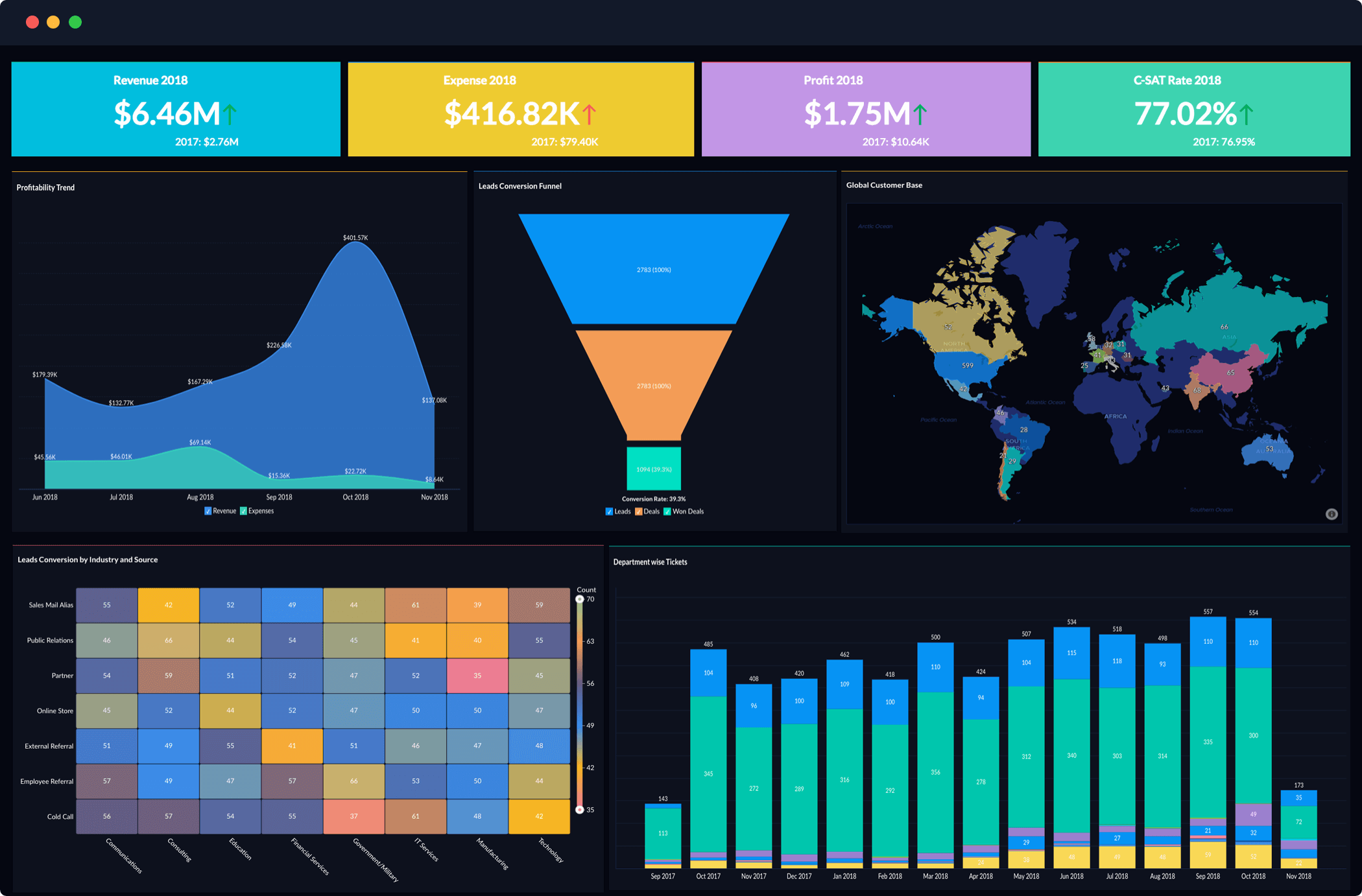
- Affordable pricing: Zoho Analytics is an affordable solution for startups, which helps to keep costs low without sacrificing quality or functionality.
- Easy to use: Zoho Analytics has a user-friendly interface that makes it easy for startups to quickly create reports and dashboards without needing extensive technical skills.
- Integration with other Zoho applications: Zoho Analytics integrates with other Zoho applications, such as Zoho CRM, Zoho Invoice, Zoho Books, and Zoho Projects, allowing startups to easily analyze data from multiple sources.
- Data visualization: Zoho Analytics provides various data visualization options, such as charts, graphs, and pivot tables, to help startups better understand their data and make informed decisions.
- Collaboration and sharing: Zoho Analytics allows startups to collaborate and share reports and dashboards with team members, making it easy for everyone to access the same information and work together effectively.
- Customizable: Zoho Analytics offers a range of customization options, allowing startups to tailor the solution to their specific needs and requirements.
Overall, Zoho Analytics is an excellent solution for startups, providing a range of tools and features that can help businesses to better understand their data, make informed decisions, and grow their operations.
Did You Know?
Here are some interesting facts about Zoho Analytics:
- Part of the Zoho suite of applications: Zoho Analytics is part of the Zoho suite of applications offered by Zoho Corporation, which includes over 45 integrated web-based applications for businesses.
- User-friendly interface: Zoho Analytics has a user-friendly interface that makes it easy for users to create reports and dashboards, even if they don't have extensive technical skills.
- Multi-source data analysis: Zoho Analytics integrates with other Zoho applications, such as Zoho CRM, Zoho Invoice, Zoho Books, and Zoho Projects, allowing users to analyze data from multiple sources.
- Real-time data analysis: Zoho Analytics provides real-time data analysis, allowing users to make informed decisions based on the most up-to-date information.
- Collaboration and sharing: Zoho Analytics allows users to collaborate and share reports and dashboards with others, making it easy for teams to work together and access the same information.
- Customizable: Zoho Analytics offers a range of customization options, allowing users to tailor the solution to their specific needs and requirements.
- Affordable: Zoho Analytics is an affordable solution, making it a popular choice for businesses of all sizes, including startups, SMBs, and enterprises.
- Trusted by thousands of businesses: Zoho Analytics is used by thousands of businesses around the world, including SMBs, startups, and enterprise-level organizations.
Cloud Storage: Services like Azure, Google Drive, or Amazon Web Services can help startups store and access their data and files. Let’s have a look at the top 3 cloud storage platforms, that Idea2MVP experts vouch on.
Azure Cloud Storage is a cloud-based storage service offered by Microsoft as part of its Azure cloud computing platform. It provides scalable and highly available object, file, and block storage services that can be used to store and access data from anywhere in the world. The benefits of using Azure Cloud Storage for startups include:
- Scalability: Azure Cloud Storage can be easily scaled to accommodate growing data storage needs without incurring significant capital expenditures.
- Reliability: Azure Cloud Storage is designed to be highly available, with multiple replicas of data stored across multiple locations to ensure that data is always accessible.
- Cost-effectiveness: Azure Cloud Storage provides a pay-as-you-go pricing model that allows startups to only pay for the storage they actually use, rather than paying for capacity that they may not need.
- Flexibility: Azure Cloud Storage can be used to store a wide variety of data types, including text and binary data, images, and videos.
- Integration: Azure Cloud Storage integrates with a variety of other Azure services, such as Azure Virtual Machines, Azure Databases, and Azure Functions, making it easy to build complete cloud-based solutions.
- Security: Azure Cloud Storage provides multiple security features to help ensure that data is protected, including encryption at rest and in transit, as well as fine-grained access controls.
Overall, Azure Cloud Storage provides startups with a scalable, reliable, and cost-effective way to store and access their data, allowing them to focus on their core business rather than on infrastructure management.
Did You Know?
Here are some interesting facts about Azure Cloud Storage:
- Azure Cloud Storage is one of the largest cloud storage services in the world, with hundreds of petabytes of data stored across its various storage services.
- Azure Cloud Storage is highly scalable, with the ability to handle millions of requests per second and store exabytes of data.
- Azure Cloud Storage supports a variety of data types, including object, file, and block storage, making it a versatile solution for a wide range of storage needs.
- Azure Cloud Storage provides multiple options for data replication, including local and geo-redundant storage, allowing customers to choose the level of redundancy that best meets their needs.
- Azure Cloud Storage integrates with a variety of other Azure services, such as Azure Virtual Machines, Azure Databases, and Azure Functions, making it easy to build complete cloud-based solutions.
- Azure Cloud Storage provides a range of security features to help protect customer data, including encryption at rest and in transit, as well as fine-grained access controls.
- Azure Cloud Storage is built on top of Microsoft's global network of data centers, providing customers with low latency and high-speed access to their data from anywhere in the world.
- Azure Cloud Storage provides a pay-as-you-go pricing model that makes it cost-effective for customers of all sizes, from small startups to large enterprises.
Google Drive is a cloud-based storage service offered by Google. It provides users with a centralized place to store, access, and collaborate on files from anywhere in the world. Google Drive offers various storage plans that cater to different needs, including individual and business users. The benefits of using Google Drive for startups include:
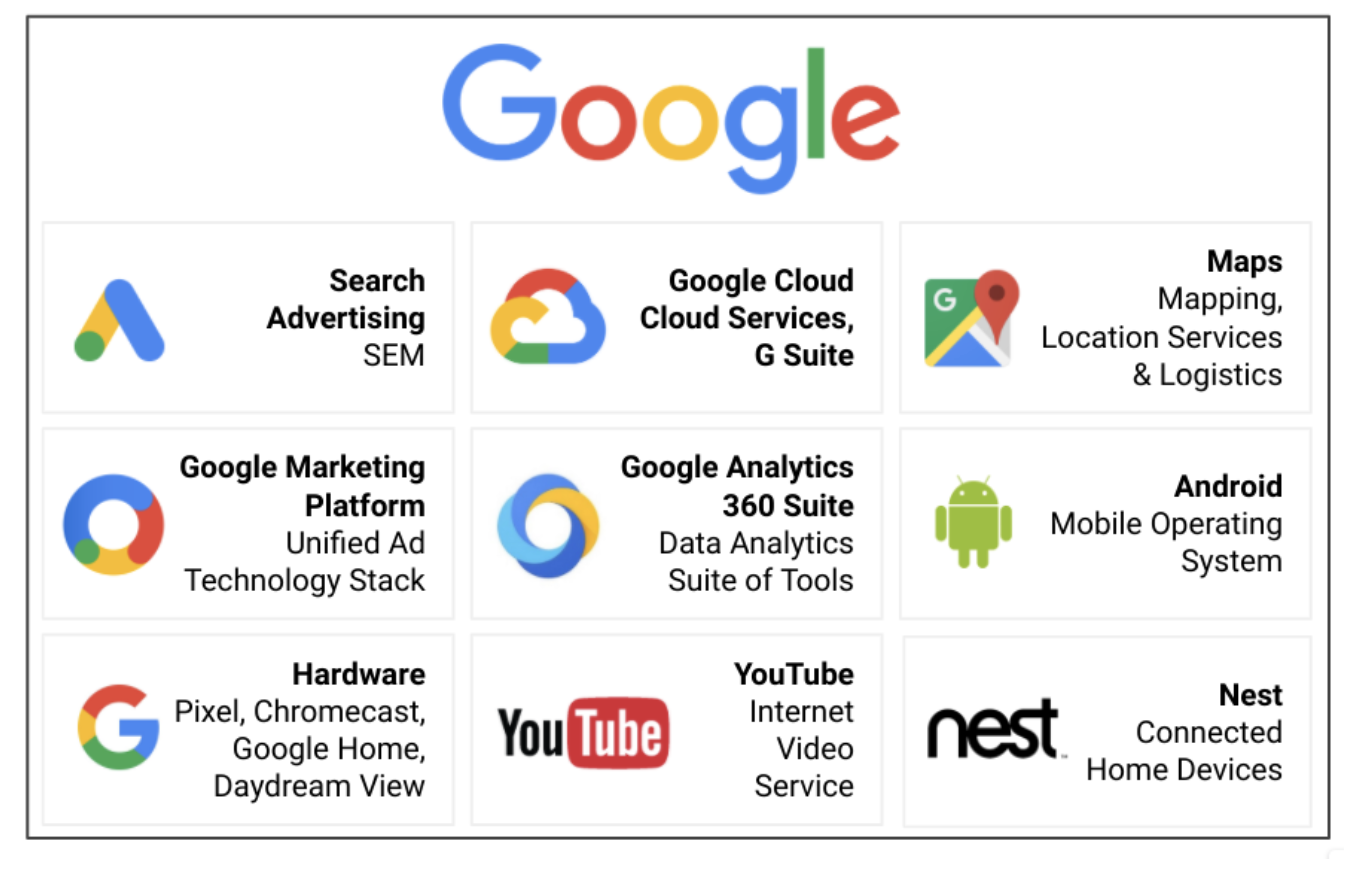
- Collaboration: Google Drive allows multiple users to access and collaborate on files in real-time, making it a convenient and effective tool for teamwork.
- Accessibility: Google Drive is accessible from anywhere with an internet connection, allowing startups to access their files from any device and location.
- Cost-effectiveness: Google Drive provides cost-effective storage plans, with various options to choose from, making it an economical choice for startups.
- Integration: Google Drive integrates with other Google services, such as Google Docs, Sheets, and Slides, allowing users to create and edit documents, spreadsheets, and presentations from within Google Drive.
- Automatic Backup: Google Drive automatically backs up files to the cloud, ensuring that data is secure and available even in case of device loss or failure.
- Security: Google Drive provides robust security features, including encryption and access controls, to help keep data safe and secure.
- Overall, Google Drive provides startups with a convenient and cost-effective solution for storing and accessing their data, as well as a platform for collaboration and teamwork.
Did You Know?
Here are some interesting facts about Google Drive:
- Google Drive was launched in 2012 as a replacement for Google's previous cloud storage service, Google Docs.
- Google Drive provides users with 15GB of free storage, with additional storage available for purchase.
- Google Drive integrates with a variety of other Google services, including Google Docs, Google Sheets, and Google Slides, allowing users to create, edit, and collaborate on a variety of documents and files.
- Google Drive has a feature called "Optical Character Recognition" (OCR), which allows users to search for text within scanned documents and PDFs.
- Google Drive allows users to share files with others through a simple link, making it easy for team members to collaborate on projects.
- Google Drive provides a range of security features to help keep data safe, including encryption and access controls.
- Google Drive has a built-in version history feature that allows users to view and revert to previous versions of a file, making it easy to recover from accidental changes or mistakes.
- Google Drive is available on a wide range of platforms, including web browsers, Android and iOS devices, and desktop computers, making it accessible from almost any device.
- Google Drive is one of the most widely used cloud storage services in the world, with millions of users storing and accessing data through the platform.
Amazon Web Services (AWS) Storage is a collection of storage services offered by Amazon Web Services (AWS), a subsidiary of Amazon.com. It provides startups with scalable, flexible, and cost-effective storage solutions for a variety of use cases. The benefits of using AWS Storage for startups include:
- Scalability: AWS Storage services can be easily scaled up or down as needed, allowing startups to accommodate changes in their storage requirements without incurring additional costs.
- Cost-effectiveness: AWS Storage services are offered on a pay-as-you-go basis, making it an economical solution for startups. AWS also offers a free tier of storage, which provides limited storage at no cost.
- Flexibility: AWS Storage services support a variety of data types, including object, block, file, and archive storage, making it a flexible solution for a wide range of use cases.
- Security: AWS Storage services provide a range of security features, including encryption, access controls, and backups, to help keep data safe and secure.
- Integration: AWS Storage services integrate with other AWS services, such as AWS Virtual Machines, AWS Databases, and AWS Analytics, making it easy for startups to build complete cloud-based solutions.
- Reliability: AWS Storage services are built on top of Amazon's highly available and scalable infrastructure, providing startups with reliable and high-performing storage solutions.
- Global accessibility: AWS Storage services are available in multiple regions around the world, allowing startups to store and access their data from anywhere in the world with low latency.
Overall, AWS Storage provides startups with scalable, flexible, and cost-effective storage solutions, along with the security, reliability, and integration features they need to build and run their applications in the cloud.
Did You Know?
Here are some interesting facts about the AWS storage:
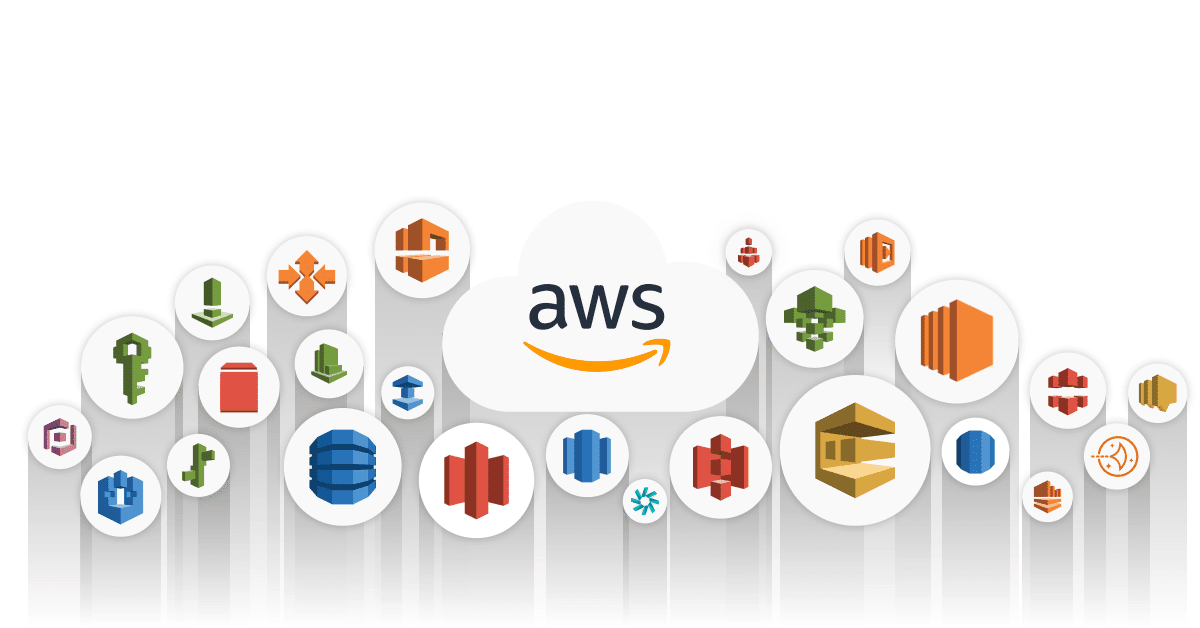
- Amazon Simple Storage Service (S3) was the first storage service offered by AWS, launched in March 2006.
- S3 is an object-based storage service, which means it stores data in individual objects, rather than as a file system.
- S3 is designed to provide 99.999999999% durability and 99.99% availability of objects stored.
- S3 supports a wide range of data types including text, audio, video, images, and backups.
- AWS provides multiple storage classes in S3 to help customers store data cost effectively. For example, S3 Standard, S3 Intelligent-Tiering, S3 One Zone, and S3 Glacier.
- Amazon Elastic Block Store (EBS) provides raw block-level storage to Amazon Elastic Compute Cloud (EC2) instances.
- EBS provides various volume types, each designed for specific use cases, such as general purpose, throughput-optimized, and cold storage.
- Amazon FSx for Windows File Server and Amazon FSx for Lustre provide fully managed file storage services.
- Amazon S3 Transfer Acceleration enables fast, easy, and secure transfers of files over long distances between your client and an S3 bucket.
- AWS Storage Gateway service provides a seamless way to integrate on-premises storage with the cloud, allowing customers to store data in the cloud while retaining low-latency access to their on-premises applications.
Payment Processing: Services like FiniGenie, Wise, Stripe, can help startups process payments from customers. Startups need payment processing tools because they allow startups to process payments securely and efficiently from customers. Payment processing is a critical component of any successful business, and startups need to be able to accept payments from customers in a variety of forms, including credit cards, debit cards, and digital wallets. Let’s have a looks at the top 3 payment processing platforms, that Idea2MVP experts use.
Stripe is a popular payment processing tool that provides a wide range of benefits for startups. Here are a few reasons why startups may choose to use Stripe as their payment processing tool:
- Easy integration: Stripe provides a simple API that can be easily integrated with a variety of e-commerce platforms, making it a convenient choice for startups.
- Global reach: Stripe supports a wide range of payment methods and is available in multiple countries, allowing startups to reach a global audience.
- Security: Stripe uses the latest security measures to protect sensitive financial data, reducing the risk of fraud and helping startups to maintain the trust of their customers.
- Customization: Stripe provides a variety of customization options, including the ability to add custom branding, checkout pages, and payment forms, allowing startups to create a seamless and branded customer experience.
- Scalability: Stripe is built to scale, allowing startups to easily accommodate changes in their payment volume as their business grows.
- Insights and analytics: Stripe provide a range of insights and analytics, including data on customer behaviour, payment trends, and revenue, helping startups to make informed business decisions.
- Affordable pricing: Stripe offers competitive pricing, with transparent fees and no hidden costs, making it an affordable option for startups.
Overall, Stripe is a convenient, secure, and scalable payment processing tool that provides startups with the features and benefits they need to efficiently process payments and grow their business.
Did You Know?
Here are some of the most interesting features of Stripe:

- Founded in 2010: Stripe was founded in 2010 by two Irish brothers, John and Patrick Collison.
- Fast growth: Stripe has grown quickly since its launch and is now one of the most widely used payment processing tools in the world.
- Valued at over $100 billion: Stripe was valued at over $100 billion after its latest funding round in 2020, making it one of the most valuable fintech companies in the world.
- Global reach: Stripe is available in over 40 countries, allowing businesses to reach a global audience and accept payments from customers around the world.
- Used by leading companies: Stripe is used by many of the world's leading companies, including Amazon, Shopify, and Uber.
- Investment from major tech companies: Stripe has received investment from major tech companies, including Visa, American Express, and Google.
- Support for a wide range of payment methods: Stripe supports a wide range of payment methods, including credit cards, debit cards, and digital wallets, making it easy for customers to complete transactions.
- Commitment to innovation: Stripe is committed to innovation and is constantly improving its products and services, making it a leader in the payment processing industry.
Wise, formerly known as TransferWise, is a payment processing platform that offers a wide range of features for startups. Here are some of the key features of Wise for startups:
- Borderless accounts: Wise offers borderless accounts, allowing startups to receive and hold money in multiple currencies, eliminating the need for multiple bank accounts.
- Multi-currency support: Wise supports payments in multiple currencies, making it easy for startups to reach a global audience and accept payments in the currency of their choice.
- Low-cost transfers: Wise offers low-cost money transfers, helping startups to save money on international transactions.
- Automated invoicing: Wise provides a streamlined invoicing process, making it easy for startups to create and send invoices to clients around the world.
- Mobile app: Wise has a mobile app, allowing startups to manage their payments and transfers on-the-go.
- Integration with accounting and business systems: Wise can be integrated with a variety of accounting and business systems, allowing startups to streamline their financial operations.
- 24/7 customer support: Wise provides 24/7 customer support, ensuring that startups have access to help and assistance whenever they need it.
- Security: Wise uses the latest security measures, including encryption and two-factor authentication, to protect sensitive financial data and ensure the safety of its customers.
Overall, Wise is a feature-rich payment processing platform that provides startups with the tools and capabilities they need to efficiently manage their finances and grow their business.
Did You Know?
Here are some interesting facts about Wise:

- Founded in 2011: Wise was founded in 2011 by Taavet Hinrikus and Kristo Käärmann.
- Rapid growth: Wise has grown rapidly since its launch, and is now one of the largest international money transfer platforms in the world.
- Borderless accounts: Wise offers borderless accounts, which are virtual bank accounts that allow businesses to receive and hold money in multiple currencies.
- Multi-currency support: Wise supports payments in over 50 currencies, making it easy for businesses to reach a global audience and accept payments in the currency of their choice.
- Low-cost transfers: Wise offers low-cost money transfers, helping businesses to save money on international transactions.
- Regulatory compliance: Wise is regulated by the Financial Conduct Authority (FCA) in the UK and is fully compliant with anti-money laundering and know-your-customer regulations.
- Investment from leading tech companies: Wise has received investment from leading tech companies, including PayPal and Virgin Money.
- Expansion into new markets: Wise is constantly expanding into new markets, making it easier for businesses to send and receive payments around the world.
FiniGenie is the platform that offers a simple yet forthright solution with the advent of customized dropdown menus and checkboxes to avail financial services. The application provides the flexibility of having credit line options and the entire process verification will be based on credit score and social score with the concept of BNPL .

FiniGenie provide merchants with the ability to accept payments from customers using various payment methods, such as credit cards, debit cards, or digital wallets. FiniGenie can handle the complex technical aspects of processing transactions, such as connecting to payment networks, verifying card information, and securely transmitting funds.
Finigenie by Ragilly's purpose is to built spend management platform that helps you escape painful repetitive work, lack of control and blinkered visibility. We bring together everything that's required to make payments for a business ranging from software subscriptions to petty cash, business travel to utility bills, employee reimbursements to vendor payouts.
Additional Tools – Suggested as per business requirements. Ask Idea2MVP experts today!
Customer Relationship Management (CRM): Tools like HubSpot, Salesforce, or Pipedrive can help startups manage customer interactions and data.
Email Marketing: Services like Mailchimp, Constant Contact, or AWeber can help startups build and manage email campaigns.
E-commerce Platforms: Platforms like Shopify, Magento, or BigCommerce can help startups sell products or services online.










